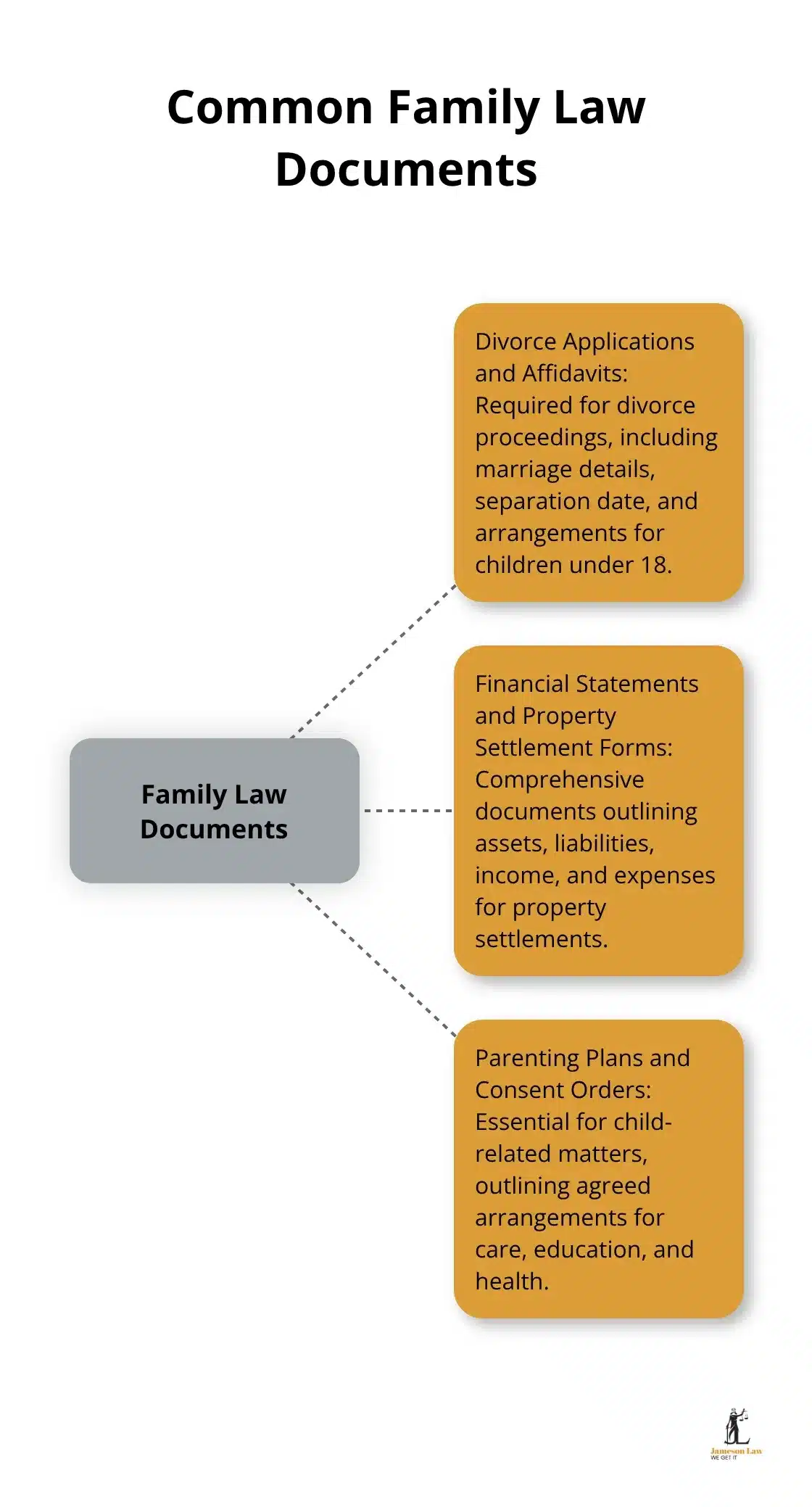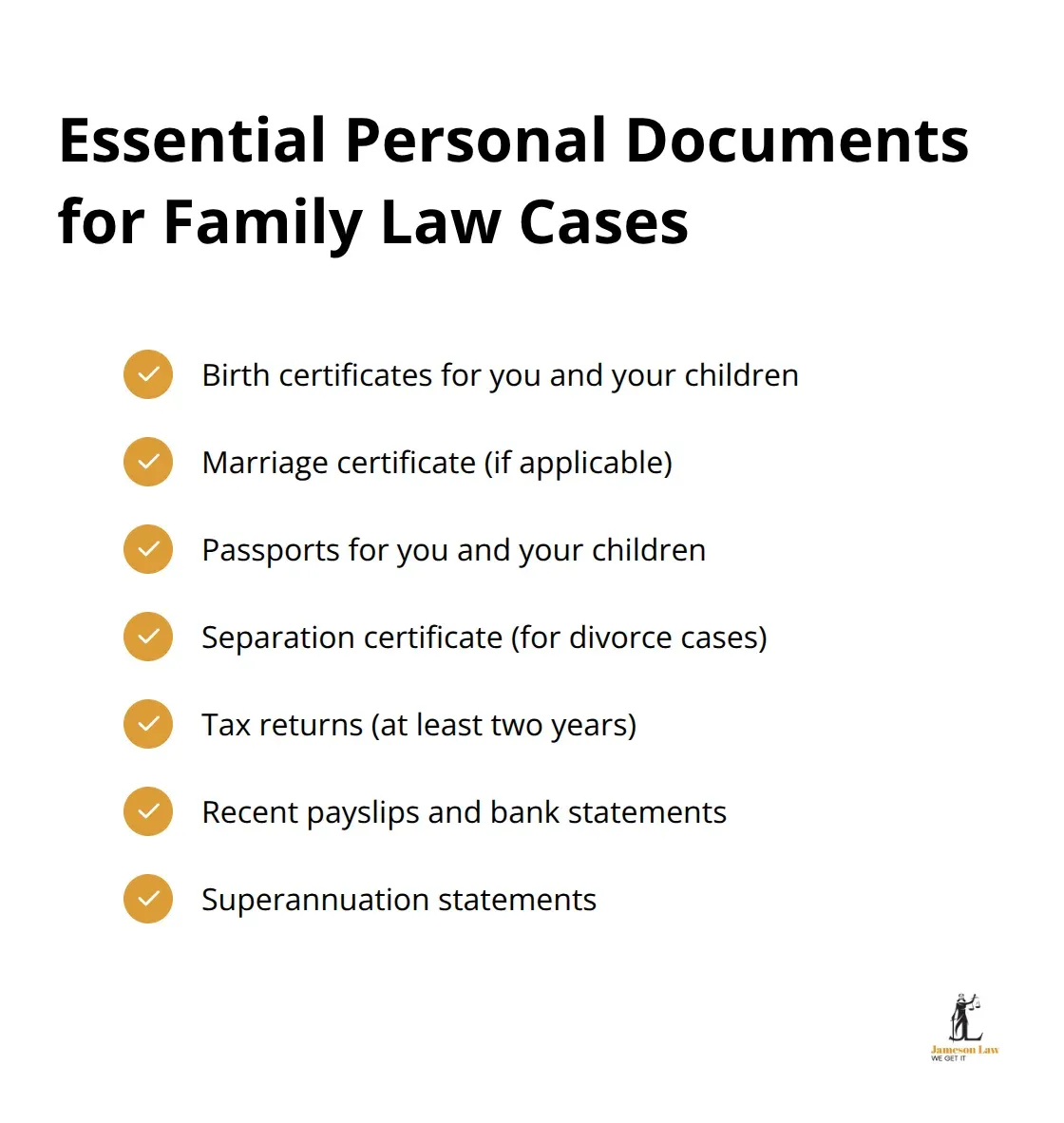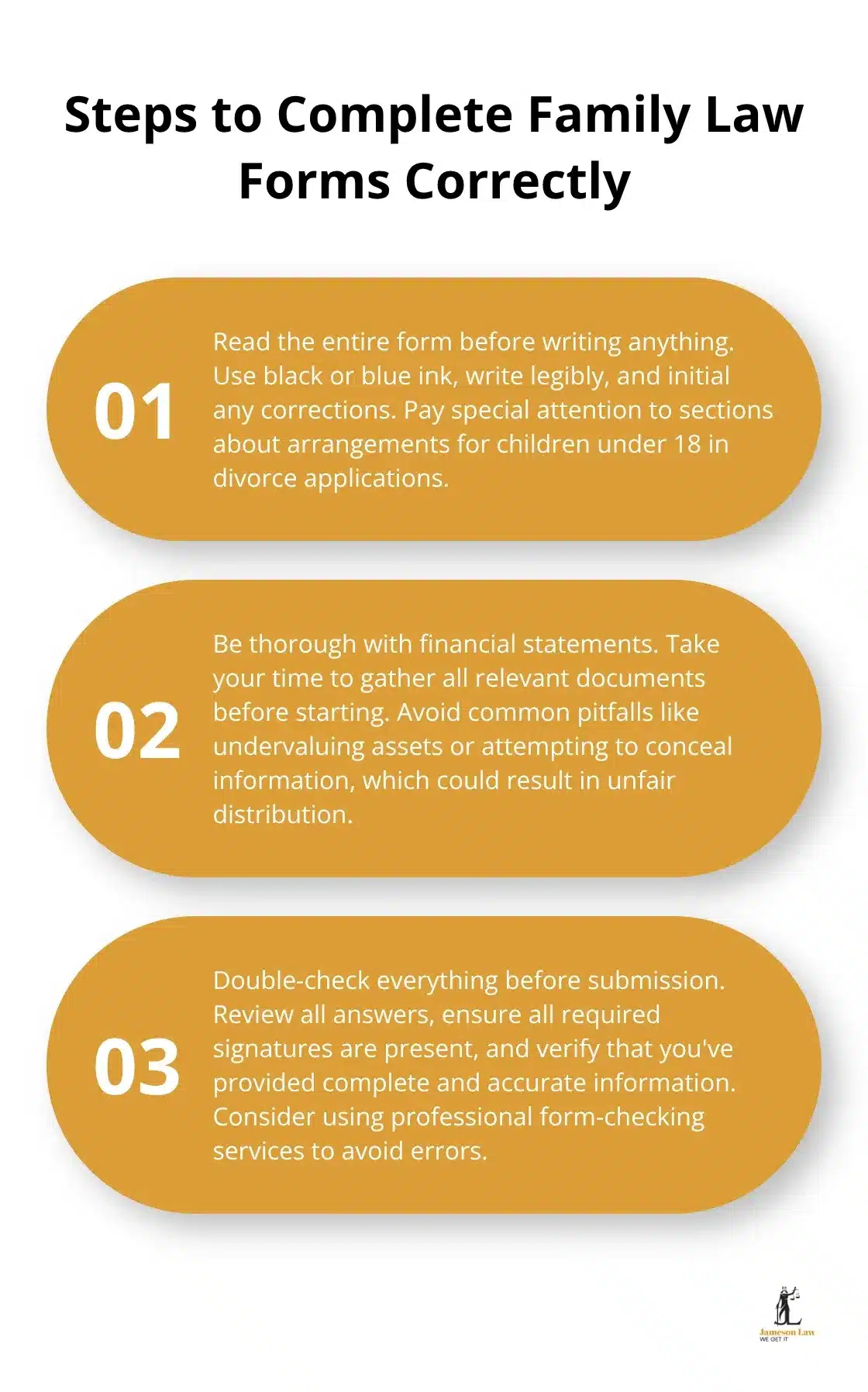Family law paperwork can be overwhelming, especially during emotionally charged times. At Jameson Law, we understand the challenges you face when dealing with legal documents in family matters.
This guide will help you navigate the complexities of family law forms, from understanding common types to gathering necessary information and filling them out correctly. We’ll provide practical tips and resources to make the process more manageable for you.
What Family Law Documents Do You Need?
Family law paperwork can overwhelm many, especially during emotionally charged times. At Jameson Law, we often see clients grapple with the volume of documents required. Let’s break down the most common types you’ll likely encounter.

Divorce Applications and Affidavits
If you seek a divorce, you must file a divorce application. This document requires details about your marriage, separation date, and arrangements for any children under 18. An affidavit (a sworn statement) supports your application, providing additional facts about your situation.
Financial Statements and Property Settlement Forms
For property settlements, you must complete a Financial Statement. This comprehensive document outlines your assets, liabilities, income, and expenses. Thorough and accurate completion is essential – omissions can lead to delays or unfair settlements.
Parenting Plans and Consent Orders
When children are involved, parenting plans become essential. These informal documents outline agreed arrangements for child care, education, and health. While not legally binding or filed in court, they form the basis for more formal consent orders (which are enforceable by the court).
The Importance of Accuracy
Accuracy in these documents is paramount. Incomplete or inaccurate paperwork can lead to delays in family law cases. This not only prolongs emotional stress but can also increase legal costs.
Proper documentation can streamline proceedings. In a recent case (handled by an experienced family lawyer), a meticulously prepared financial statement led to a fair property settlement in just two mediation sessions, saving thousands in potential court fees.
Each document serves a specific purpose in your family law matter. You might feel tempted to rush through the paperwork, but taking the time to understand and accurately complete each form can significantly impact the outcome of your case.
As we move forward, let’s explore the key information required in these family law documents and why complete documentation matters so much in the legal process.
What Documents Do You Need for Family Law Cases?
Family law cases require a comprehensive set of documents to support your case. At Jameson Law, we understand the importance of proper documentation. Let’s explore the essential papers you need and how to obtain them.
Essential Personal Documents
Start with the basics. You need your birth certificate, marriage certificate (if applicable), and passport. These documents prove your identity and marital status. Don’t forget your children’s birth certificates and passports too.
For divorce cases, you also need your separation certificate. This document proves when you and your partner separated, which is critical for the 12-month separation requirement in Australia.
New family law information sharing rules for 2024-2025 enhance court access to safety data and provide stronger privacy protections.

Financial Records: The Backbone of Property Settlements
Financial documents form the foundation of property settlements. Collect at least two years of tax returns, recent payslips, and bank statements. If you own a business, include profit and loss statements and balance sheets.
Superannuation statements often slip through the cracks but are vital. Splitting super is the most common way that couples apportion accumulated assets during divorce or separation.
How to Obtain Official Records
Acquiring official documents can be challenging. For birth, death, and marriage certificates, contact the Registry of Birth, Deaths and Marriages in your state. In NSW, you can order these online through the Service NSW website.
For financial records, most banks offer at least 7 years of statements online. If you need older records, you might have to request them directly from your bank (which can take time).
Organise Your Information Effectively
Create a digital filing system. Scan all your documents and save them in clearly labelled folders. This makes it easy to share with your lawyer and access when needed.
Use a spreadsheet to list all your assets and debts. Include details like purchase dates, current values, and any associated loans. This gives you and your lawyer a clear financial picture at a glance.
Keep a timeline of important events related to your case. Note down dates of separation, major purchases, or significant incidents. This can prove invaluable when preparing affidavits or discussing your case with your lawyer.
Proper preparation can save you time and money in the long run. Having all your documents ready sets the stage for a smoother legal process. Now that you’ve gathered your documents, let’s move on to the next crucial step: filling out family law forms correctly.
How to Complete Family Law Forms Correctly
Start with the Basics
Read the entire form before you write anything. This gives you a clear picture of what’s required. Use black or blue ink and write legibly. If you make a mistake, cross it out with a single line and initial the change.
The Application for Divorce form is one of the most common. When you complete this form, pay special attention to the section about arrangements for children under 18. The court needs to know these arrangements are satisfactory before it grants a divorce.
Be Thorough with Financial Statements
Financial statements often take the most time. They require detailed information about your assets, liabilities, income, and expenses. Don’t rush this process. Gather all relevant documents before you start.
A common pitfall is undervaluing assets. Hidden assets can be another area of concern. One party may attempt to conceal or undervalue assets, which could result in an unfair distribution.

Seek Help for Complex Forms
Some forms, like those for property settlements or parenting orders, can be complex. Don’t hesitate to seek professional help. Many people try to save money by completing forms themselves, only to face delays or unfavourable outcomes due to errors.
The Federal Circuit and Family Court of Australia website offers helpful guides for filling out forms. They provide step-by-step instructions and examples. However, these guides can’t replace personalised legal advice for your unique situation.
Double-Check Everything
Before you submit any form, review it carefully. Check that you’ve answered all questions and signed where required. Missing signatures are a common reason for forms being rejected.
If you’re unsure about any part of a form, it’s better to ask for clarification than to guess. Incorrect information, even if unintentional, can harm your case. Many law firms (including Jameson Law) offer form-checking services to ensure everything is in order before submission.
Use Technology to Your Advantage
Try to use digital tools to streamline the form-filling process. Many courts now accept electronic submissions, which can save time and reduce errors. Keep digital copies of all your completed forms for easy reference and future use.
Final Thoughts
Family law paperwork can overwhelm many individuals. You should start by understanding the required documents and their purpose. Gather all necessary personal and financial information meticulously, ensuring you have official records and certificates at hand.
When you fill out forms, take your time and double-check every detail. Accuracy and completeness in your family law paperwork can significantly impact the outcome of your case (it’s not just about ticking boxes). This can lead to fairer settlements and smoother proceedings, potentially saving you time, money, and emotional stress.
Complex cases often benefit from expert legal advice. At Jameson Law, we specialise in guiding clients through the intricacies of family law paperwork. We try to ensure your rights and interests are protected throughout the process.













